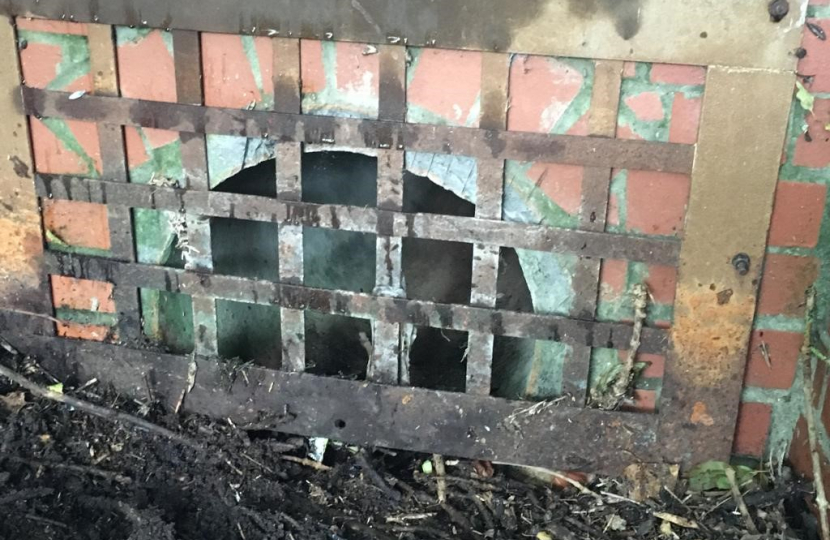
I wrote about storm discharges about a year ago and was clear that sewage pollution is not acceptable. My position remains the same and people who say that I have voted to pollute our rivers and the sea are deliberately distorting my view. We have also published our new manifesto, Changing Course: A manifesto for our rivers, seas and waterways, produced by the Conservative Environment Network, with six ways the Government can tackle pollution, strengthen our water security, and empower communities.
Whilst fully accepting that the pollution is not acceptable we also need to be honest and realistic about the time it will take to reduce this to zero. The discharge of sewage into rivers is not a product of privatisation. It was permitted pre-privatisation by successive governments. When these discharges of untreated sewage are released into a river it is predominantly when water levels are exceptionally high and there is risk of flooding to properties. If you live in a property which, as things stand, would be flooded with raw sewage if these discharges were not made, you might take a different view to those wanting to swim in the river.
Tackling storm overflows is a priority and this is the first Government to come forward with a plan to work with water companies to reduce sewage overflows. The Government is committed to protecting public health and the environment from storm overflow discharges. The problem is one that is being tackled by the water industry, and we need to speed that up as much as we can. I keep in regular contact with Thames Water in our area on this alongside a range of other issues.
The problem stems from Victorian infrastructure and a massive increase in the population, and this is the first Government to take steps to tackle it. Let me also be clear that this has nothing to do with leaving the EU. The Environment Act 2021 has made our laws even stronger on water quality than when we were in the EU. The Storm Overflows Discharge Reduction Plan will require water companies to deliver their largest ever environmental infrastructure investment, but it will take time. In September, the Secretary of State for Environment, Food and Rural Affairs asked water company bosses to write to him with their plans to accelerate investment in infrastructure. In London, for example, this is being delivered by a massive investment in a new super sewer costing almost £4 billion which will be ready in 20024. The Thames is considered to be the cleanest rivers in the world that flows through a major city. It is home to 125 species of fish and more than 400 invertebrates.
Water companies will have to achieve a number of strict targets, which will require them to take measures such as increasing the capacity of their networks and treating sewage before it is discharged, while massively reducing all discharges. As it stands, water companies are investing £3.1 billion to deliver the 800 storm overflow improvements across England by 2025. Ministers are working with water companies to explore accelerating infrastructure projects.
There is a focus on designated bathing areas and I understand that by 2035, water companies will have to improve all storm overflows discharging into or near these areas and also improve 75 per cent of overflows discharging to high priority nature sites. By 2050, this will apply to all remaining storm overflows covered by our targets, regardless of location. Ministers will review the plan in 2027 to consider where we can go further, taking account of innovation and efficiencies.
The plan also required water companies to publish discharge information in near real time and sets out Ministers’ wider expectations for the industry to ensure their infrastructure keeps pace with increasing external pressures, such as urban growth and climate change and to ensure our water supplies remain clean and secure for the future.
Alongside this Ministers will take forward plans to lift the Environment Agency’s maximum civil fine for individual breaches of the rules whilst at the same time ensuring that there will be no change to consumer bills before at least 2025. It is important to strike a balance between the need for investment and the impact on consumers. Water affordability is important, and the Government ruled out options which could have added a substantial increase to household water bills.
Under the Government’s proposed plan:
- By 2035, the environmental impacts of 3,000 storm overflows (75%) affecting our most important protected sites will have been eliminated.
- By 2035, there will be 70% fewer discharges into bathing waters –(using last years figures that would have equated to 4,620 fewer discharges into our bathing waters during the bathing season).
- By 2040, approximately 160,000 discharges, on average, will have been eliminated (40% of the total); and by 2050, approximately 320,000 discharges, on average, will have been eliminated (80% of the total).
- The consultation outlines how water companies are expected to achieve these targets, including mapping their sewer networks, reducing surface water connections and engaging in long-term collaborative planning.
Let me now comment on issues around pay and dividends which are often raised. The Government has been clear that companies cannot profit from environmental damage. Ofwat has outlined that water companies must be transparent about how executive pay and dividends align to delivery of services to customers, including environmental performance. The Government supports Ofwat’s recent proposals, which would provide extra powers for enforcement action against companies that do not link dividend payments to their environmental performance, or who failed to be transparent about their dividend pay-outs.
The Government, the Environment Agency (EA) and the regulator Ofwat have been working to drive up water companies’ performance and monitoring and increase accountability. This includes a massive expansion in monitoring frequency and duration of discharges, from approximately 5 per cent in 2016 to nearly 90 per cent in 2021, and 100 per cent coverage will be reached by 2023. Ministers have significantly improved transparency through the Environment Act by making it a legal requirement for water companies to provide discharge data to the EA and to make it available in near real time to the public.
Last year, the EA and Ofwat launched the largest criminal and civil investigations into water company sewage discharges ever, at over 2200 treatment works, following new data coming to light as a result of increased monitoring. The investigations will look at where sites may be breaching their permits and ensure that companies found to be acting illegally are held to account, up to and including prosecution, which can lead to unlimited fines and companies having to reimburse customers. This follows 54 prosecutions against water companies since 2015, securing fines of nearly £140 million.
Some suggest that the water companies should not have been privatised. This misses an important point. Without this we would not see the investment that has been put in over recent decades. Privatisation of the water sector has delivered around £170 billion of investment through private finance. This simply would not have been possible if the industry were still in public ownership. Ministers will continue to utilise the strong regulatory environment to push companies to ensure they invest and continue to deliver on the public’s priorities.

